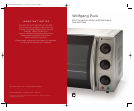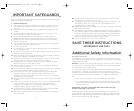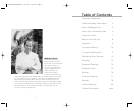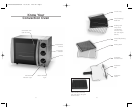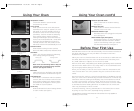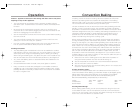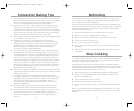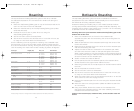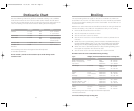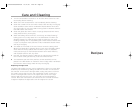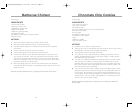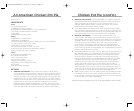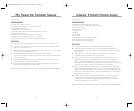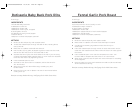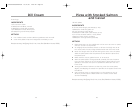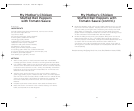
9
Operation
Caution: Appliance surfaces are hot during and after use! Do not place
anything on top of this appliance.
• The convection fan is programmed to operate on Bake, Defrost,
and Slow Cook. To bake without convection, select the Roast/Pizza
function.
• Be sure that the Temperature Control is set to “0” and the Time
Control is set to “Off” before plugging the cord into the outlet for use
and when unplugging the oven after use.
• Set the Temperature Control and the Function Control before setting
the Time Control.
• The oven will only operate if the Time Control is turned to a time
setting or if it is in the “Stay On” position.
• For even cooking, always place foods in the oven with at least one
inch of space on all sides to allow proper air circulation.
Cooking Containers
• The drip/baking pan included with the oven is suitable for cookies,
rolls, biscuits, nachos, pork chops, etc. It may be easier to use a non-
stick spray when using the drip/baking pan for baking or broiling.
When using as a baking pan, only place the pan in the middle or top
rack and increase the recommended temperature by 50 degrees F.
• Any oven-safe baking pans or casserole dishes are suitable for the
convection oven.
• Choose bakeware made of metal, oven-proof glass or ceramic.
• Many convenience foods are packaged in nonmetallic containers
suitable for use in microwave ovens as well as regular ovens. Check
package directions carefully to determine if the container is suitable
for use in a regular oven.
Convection Baking
In baking mode the bottom heating elements operate at full power
and the top heating elements operate at 50% power. The heating
elements will cycle on and off to maintain the selected temperature.
The Convection fan will operate during the Bake cycle.
The fan circulates the hot air around the food making baked goods rise
quickly. In many convection ovens, it is necessary to lower the baking
temperature to achieve acceptable results. Your Bistro Convection Oven
has been designed for easy use. Lowering the baking temperature is not
necessary. Follow package or recipe directions remembering not to
preheat the oven and check after the shortest baking time. Always
rotate food half-way through the cooking cycle.
When using the baking racks, you should use the lowest rack position.
If using the baking rack in the lowest rack position, make sure that it is
facing up. See figure 3. The drip/roasting/baking pan included with your
oven can also be used for baking. It is enamel coated making it easy to
clean. When not in use, the drip/roasting/baking pan should always be
removed from the oven when baking as it will interfere with the flow of
hot air from the bottom elements. When it is being used as the baking
pan, the pan should be placed in the middle or upper racks, and the
temperature must be increased by 50 degrees F. If you need to accom-
modate a larger cut of meat or poultry on the drip pan, place the pan on
top of the bottom rails, not in them .
1 Place the oven rack or baking pan in the desired rack position. If
using the lowest position the rack should be facing up.
2 Set the Temperature Control to the recommended temperature.
3 Set the Function Control to “Bake”.
4 Set the Time Control to the shortest baking time in the recipe and
check for desired doneness.
A Note on Baking Times:
Convection air is superheated and it circulates around the food, so it
cooks food faster. When baking your favorite recipes or packaged goods,
follow recipe instructions remembering not to preheat. Check baked
goods a few minutes before shortest recommended baking time.
Recommended Baking Temperatures (in fahrenheit)
Cakes: 325°- 350°
Cheesecake: 275°
Quick Bread: 375°
Proofing Bread Dough
When making yeast bread, you can proof (raise) the dough in the oven
on the Bake function. Set the Temperature Control to MAX and let the
oven run for one minute. Turn the oven off, place the dough in the center
rack of the oven and allow it to double in size.
Muffins: 350° - 375°
Pies: 350°
Cookies: 350°
10
FG_24LConvecOvenmanual 10/11/06 2:26 PM Page 11



